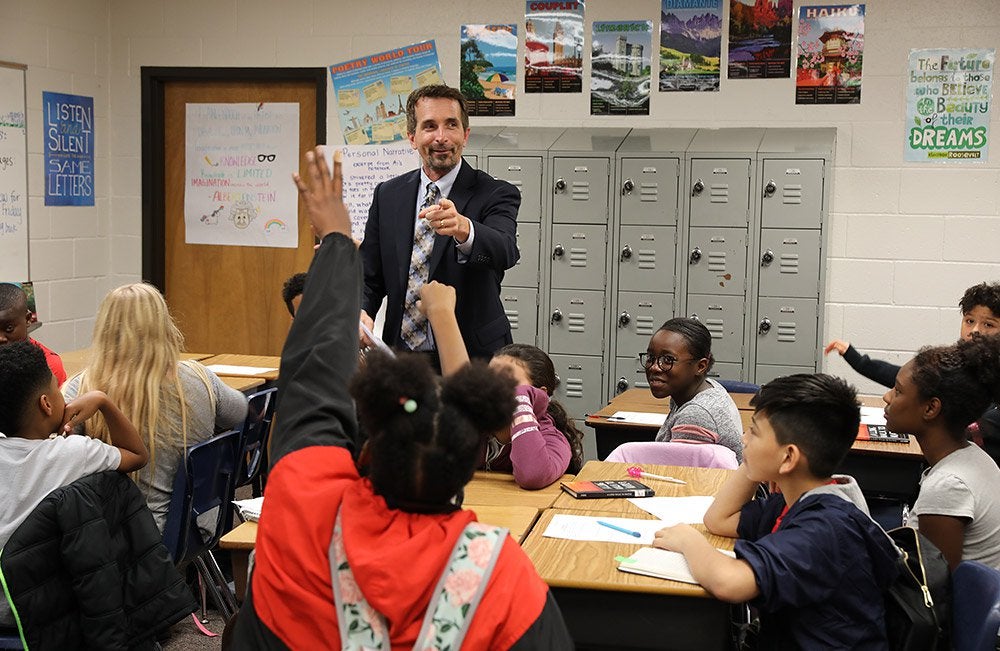My question hung in the air at a conference for rural school and district leaders: How many of you have heard common misconceptions about equity-related issues for students, like chronic absenteeism and access to diverse teachers? Slowly a principal raised his hand and shared that he, as a school leader, until recently believed that at-risk families (those living below the poverty line and/or facing significant financial or emotional hardships) value school less and therefore do not believe in the importance of regular attendance. I found his honesty remarkable, and it spurred a conversation about the importance of shifting to what’s been identified as an “equity mindset”—where we value the life experiences of all students and their families by identifying and removing misconceptions and barriers so we can provide differentiated supports and services to those most at-risk.
Shifting to an equity mindset on attendance, to use this example, means that we assume all of our families equally value the importance of their children’s education. Rather than accept the status quo, we therefore focus on understanding what might get in the way of their children’s attendance, and try to remove those barriers. And when we succeed, we can dramatically accelerate the trajectory of a student’s pathway towards postsecondary opportunities. For example, when low income elementary students attend school regularly, they can see outsized literacy gains, eight percent more growth in kindergarten and seven percent more growth in first grade than their higher income peers (Ready, 2010). By the time they hit sixth grade, students attending more than 90 percent of the time have significantly greater chances of graduating on time (Balfanz, Herzog, & Maclver, 2007). The key is helping to make sure students at risk attend – something that begins with an equity mindset.

In the struggle to create great schools for all students, equity often rides at the back of the bus. The Tennessee Leaders for Equity Playbook provides a powerful framework to change that dynamic. It is an especially thoughtful and actionable tool to bring equity to center stage in classrooms and schools.
— Dr. Joseph F. Murphy, Associate Dean, Peabody College of Vanderbilt University
Evidence-based equity shifts of this sort are part of the Tennessee Leaders for Equity Playbook, a publication developed by the Tennessee ESSA Leadership Learning Community (ELLC) team as part of its participation in a collaborative effort of the Council of Chief State School Officers, the Council of the Great City Schools, the National Urban League and The Wallace Foundation, funded by Wallace. The initiative brings together teams from 10 participating states—each working on its own state’s priorities for and approaches to building the capacity of principals and other school leaders to support schools and students most in need of improvement—to help them develop their plans and to learn from each other’s work. Our playbook in Tennessee was developed by a statewide team of school, district, community, higher education and state leaders, with substantial feedback received from a comprehensive set of stakeholder groups. It features seven equity commitments, all selected for their strong research base that correlates with improved student outcomes, and corresponding actions for school, district, school board and community leaders:
- Decrease chronic absenteeism
- Reduce disproportionate suspension and expulsion rates
- Increase early postsecondary opportunities
- Provide equitable access to effective teachers
- Recruit and retain a diverse teaching force
- Embed cultural competence in school practices
- Partner with community allies
The use of the word commitments is intentional to signal the importance of taking deliberate and specific action to advance equity. Other sections of the playbook include an action plan framework to assist leaders in the selection, implementation and monitoring of the most relevant equity commitments for their community; an “equity shifts continuum” describing the common misconceptions that must be examined and discussed for each equity commitment before moving to an equity mindset; and a list of key terms defined, including “equity” and a “leader for equity.”
My interaction with the rural principals demonstrates the importance of viewing equity through two lenses: improving outcomes for all students is not an exclusively urban problem and equity needs to be embedded into the DNA of school and district policies and practices if we want to successfully move our collective thinking about equity from an initiative to a necessary and enduring systematic approach for reaching every student. This shift requires us as leaders to grapple with the powerful notion that student outcomes will not improve until adult learning and behaviors change.
Since the release of the Playbook in the spring of 2018, I have been fortunate to see both rural and urban districts in Tennessee use it as a training and support tool to help shift adult learning and behaviors towards equity. For example, Bobby Cox, superintendent of rural Warren County, uses it as part of a comprehensive district approach for training all employees, from district leaders and principals to cafeteria workers and bus drivers on the importance of learning strategies—such as providing meditation and counseling for disciplinary infractions rather than relying exclusively on out-of-school suspensions. This approach helps increase the social and emotional well-being of students. And it’s paying big dividends so far with significant increases in student attendance; the chronic absenteeism rate is 3 percent this year compared with 14 percent last year, with decreases in out-of-school suspensions.
I am convinced the equity shifts and commitments we’ve articulated in the Tennessee Leaders for Equity Playbook can play a role in accelerating the urgency and summoning the collective courage we need to make educational equity no longer a dream deferred in our state. We hope it can help provide a guide for others across the country, as well.
Paul Fleming is the former Assistant Commissioner for the Teachers and Leaders Division at the Tennessee Department of Education. He's now the Chief Learning Officer at LearningForward. Read more about him at LearningForward's website.



